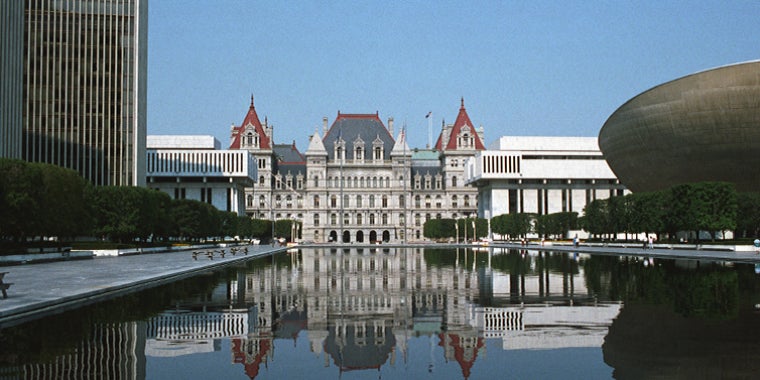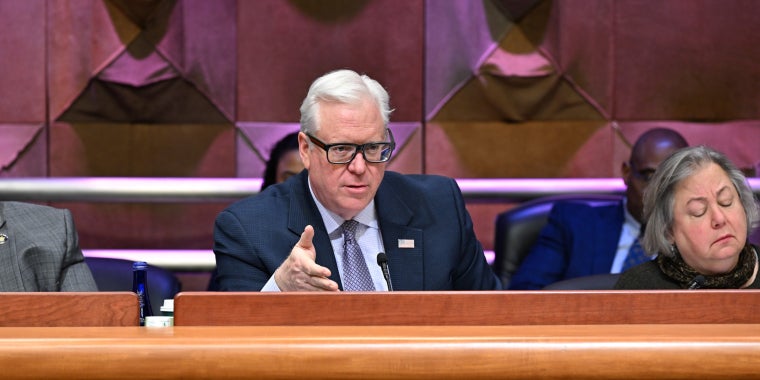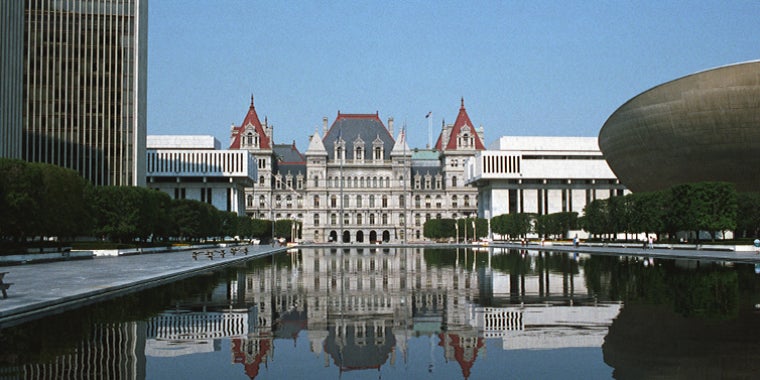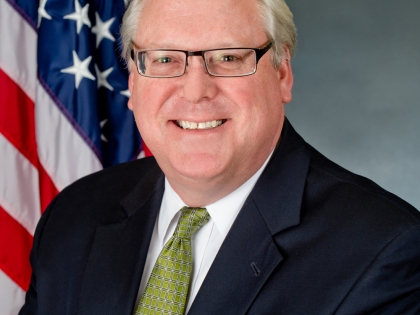
O’Mara, Palmesano, Friend join local leaders to reject governor's proposed cuts in state funding for local roads and bridges
February 15, 2024
-
ISSUE:
- local roads and bridges
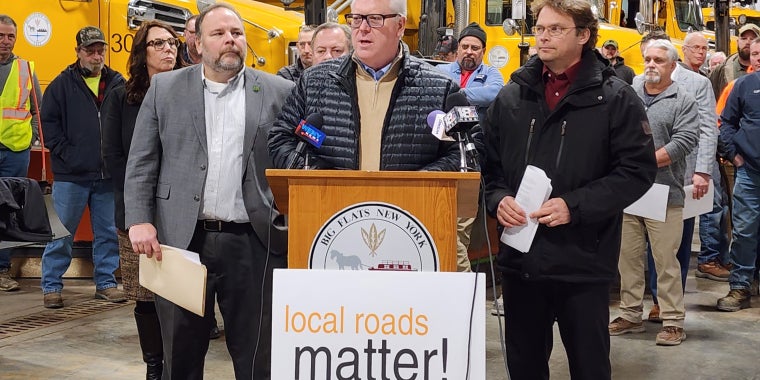
Senator O'Mara (at podium), Assemblyman Palmesano (l.) and Assemblyman Friend (r.) at today's news conference at the Big Flats Town Highway Garage.
Big Flats, N.Y., February 15—State Senator Tom O’Mara (R,C-Big Flats), Assemblyman Phil Palmesano (R,C-Corning), and Assemblyman Chris Friend (R,C-Big Flats) were joined by regional leaders and representatives of local highway departments today to reject Governor Hochul’s cuts in critical state funding for local roads and bridges in her proposed 2024-25 state budget.
At a news conference at the Big Flats Town Highway Garage, the group also called on the governor and the Democrat leaders of the state Legislature to restore the proposed cuts and keep strengthening New York’s commitment to local transportation infrastructure.
O’Mara, Palmesano, and Friend are once again being joined this year by their Republican colleagues in the Senate and Assembly to highlight their opposition to Hochul’s slashing of local transportation aid, particularly a proposed $60-million cut for the Consolidated Local Street and Highway Improvement Program (CHIPS), the state’s primary source of funding for local roads, bridges, and culverts.
In a February 14, 2024 letter (see attached copy above) to Hochul and legislative leaders, O’Mara, Palmesano, Friend and their colleagues wrote, in part, “We once again stress that New York State's direct investment in local roads and bridges through CHIPS remains fundamental. It deserves priority consideration in the final allocation of state infrastructure investment in the budget for the 2024-25 fiscal year. CHIPS is the key difference for local communities, economies, governments, motorists, and taxpayers throughout the Empire State, including New York City and surrounding metro areas, and we cannot ignore this fact, especially this year. It is warranted. Local governments, for the foreseeable future, will continue to struggle to address budgetary demands in the face of the state-imposed property tax cap, rising pension, health care and highway construction costs, and unfunded state mandates, among other burdens.”
Legislators and local roads advocates statewide have been critical of Hochul’s proposal for failing to recognize the enormous impact inflation is having on the costs of construction and, consequently, on the budgets of local highway departments. Nationally, according to the Federal Highway Administration’s Highway Construction Cost Index, highway construction costs since 2022 have increased by nearly 60 percent. These unprecedented cost increases alone make the Governor’s proposal is unacceptable.
They also criticize the Hochul plan for failing to achieve the goals of equitability, fairness, and parity in transportation funding for the upstate and downstate regions of New York, noting that the Governor’s proposed budget includes a $100-million reduction (including the $60-million cut in CHIPS funding) to local road, bridge, and culvert funding for the third year of the five-year, Department of Transportation (DOT) Capital Plan.
As Hochul and the Democrat leaders of the Senate and Assembly approach negotiations over a final 2024-25 state budget scheduled to be in place by April 1, O’Mara, Palmesano, Friend and their legislative colleagues are calling for this year’s final budget to restore Hochul’s proposed $60-million cut to CHIPS base aid and then increase the CHIPS base funding level by $200 million to a total of $798.1 million.
Since 2013, O’Mara, Palmesano and Friend have built a coalition of support within the state Legislature and worked closely with local transportation advocates from throughout New York on the “Local Roads Are Essential” advocacy campaign annually sponsored by the New York State Association of County Highway Superintendents (NYSCHSA) and the New York State Association of Town Superintendents of Highways, Inc. (NYSAOTSOH). The campaign brings hundreds of local transportation advocates to Albany in early March to rally support.
The latest analysis by the New York State Association of Town Superintendents of Highways has found that the local highway system outside of New York City faces an annual funding gap of over $2 billion.
Estimates by the State Comptroller, state Department of Transportation (DOT), and other independent studies have shown a large number of local road mileage deteriorating and many local bridges rated structurally deficient or functionally obsolete.
The 27th Annual Highway Report from the Reason Foundation, released last April, ranked New York State’s highway system at 49th in the nation.
According to the latest analysis from TRIP, a national transportation advocacy group, roads and bridges that are deficient, congested, or lack desirable safety features, cost New York motorists an additional $36.7 billion annually, up to $3,697 per driver in some areas, due to higher vehicle operating costs, traffic accidents, and congestion related delays.
In a joint statement, O’Mara, Palmesano and Friend said, “The ‘Local Roads Are Essential’ coalition has worked long and hard over the past decade to strengthen New York State’s commitment to local transportation infrastructure. Now is no time for this state to begin turning its back on this commitment. Governor Hochul has proposed a budget of misguided and misplaced priorities. She commits billions upon billions of dollars to provide programs and services to thousands of illegal migrants streaming into this state with no end in sight. She is pushing forward politically driven energy mandates on all New Yorkers that will cost hundreds of billions of dollars. Yet to afford these and many other questionable spending priorities, Governor Hochul is attempting to balance her budget by cutting fundamental responsibilities in education, transportation, and other key areas. It’s wrong and it can’t stand. We have long stood with New York’s county and town highway superintendents, and local leaders, in support of stronger state investment in our local roads, bridges, and culverts. We continue to believe this commitment is a fundamental responsibility and critical to the strength and success of local communities, economies, environments, governments, and taxpayers. We will do everything we can to raise our voices, raise awareness, and raise support for the local roads and bridges that are essential to New York’s future.”
City of Elmira Mayor Dan Mandell said, “The cut in Consolidated Highway Improvement Program (CHIPS) funding in the Governor’s current 2025 budget proposal comes at a time where costs are rising to pave and maintain local roads. I urge the Governor not to cut funding as this would create a hardship on the City of Elmira in our efforts to maintain and repair our roads.”
City of Hornell Mayor John Buckley said, “Local governments have made progress in recent years receiving increases in funding related to roads and highways. However, those increases have been and continue to be eroded by inflation. Now, the Governor has proposed a $60 million dollar cut in CHIPS funding in the executive budget yet has announced a staggering $2.4 billion dollars to be sent to New York City to deal with the massive influx of migrants. If the State of New York can afford to spend billions on non citizens, at the very least, it can surely maintain current levels of funding for repair and replacement of our roads and highways. Road and highway funding programs such as CHIPS, PAVE NY, Winter Recovery, and Pave Our Potholes should be increased annually to keep up with inflation. Cutting crucial funding streams such as these adds more pressure to local governments and is an insult to residents.”
Ann Milliken Gerould, Supervisor, Town of Elmira, said, "We appreciate and applaud the efforts of Senator O'Mara, Assemblyman Palmesano and Assemblyman Friend to encourage strong state support for CHIPS funding. This state support is absolutely critical to the ability of our local highway departments to adequately maintain and revitalize the local roads and bridges our communities depend on. A cut in funding like what is being proposed would be extremely difficult for localities to absorb and poses a real risk to the quality of local transportation infrastructure."
Bob Eastwood, Town of Van Etten Highway Superintendent and President of the Chemung County and Town Highway Superintendents Association, said, “Stronger state investments in recent years to our local highway departments through CHIPS and other programs have made an enormous difference. If this critical source of support gets pulled out from under us now, at a time when construction costs have never been higher, it would be a real crisis for many local departments with budgets that are already stretched thin.”
Kelly Fitzpatrick, Chair of the Steuben County Legislature, said, “CHIPS funding represents New York’s commitment to infrastructure for the common person. Our road and system is extensive and is well main-maintained – thanks to the extra funding from New York. The Governor’s Executive Budget proposal would be devasting to Steuben County because we rank third for the amount of miles and have the most bridges of any County. Cutting this funding is like a slap in the face to the common taxpayer who goes to work every day and relies upon the road system for his/her every day life.”
Ken Thurston, Schuyler County Superintendent of Highways and Facilities, said, “Record high inflation rates on highway construction materials have severely increased costs and, as a result, our local highway maintenance programs are struggling to meet our infrastructure needs. The Governor’s Executive Budget proposal to cut funding will create additional burdens and issues. Many Towns and Counties depend on this funding for all their Highway Maintenance needs and do not have local funds to help support their maintenance programs. With cuts in this funding, it will fall on the backs of local taxpayers if the Governor does not support our needs.”
Share this Article or Press Release
Newsroom
Go to Newsroom
